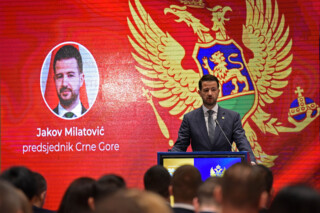Vesna Šofranac
Public debt reduction estimates, made by the World Bank, are very good and we know that. We also know debt has reached its culmination and that reduction is coming. We just have to make through this year now. Of course, GDP has to grow and it will, according to projections, says in the interview for Dnevne novine, Professor Božo Mihailović, Professor at the Faculty of Economics and president of the Association of Economists.
Projections of the World Bank indicate that GDP growth in 2019 will be 3%. What do you think about that?
Mr Mihailović: Well, as immodest as this may sound, I will remind you that my estimate of last year’s GDP growth was correct. I said it would reach 5% and that the same growth trend would continue. With all due respect, I think GDP growth will be higher than the estimates made by World Bank and IMF. I definitely don’t think that Montenegro’s economy is all sunshine and rainbows. However, we can’t but notice that pensions are paid with the so called filigree precision, staff in the education, state administration and healthcare sector receives salaries on regular basis…
That’s true, but people are still dissatisfied with their salaries, particularly in education and healthcare sector.
Mr Mihailović: And that comes as no surprise. There has been an imbalance. Once a professor used to have the salary of a minister or an MP. Now, that’s different. State administration should be rearranged. It’s gone far enough to state that we have a very expensive state.
IMF has warned that share of personal consumption expenditures in GDP structure is huge. On the other side, employees request higher salaries…
Mr Mihaliović: 75% share of personal consumption expenditures in the structure of GDP really is huge but if you cut pensions, while minimum one amounts to €280 and average consumption totals €600, then what do you get?
In order to increase salaries for those who are financed from the budget, expenditures should be increased first. That means either increasing taxes or indebtedness. That doesn’t happen overnight. You can increase salaries slightly, not drastically. I’m always for finding solutions, not waiting.
WB projected that public debt would go up to 78% level, with tendencies to go down next year.
Mr Mihsliović First of all, I’d like to revitalize that “huge indebtedness” thesis concerning Montenegro. I’m often asked: “Professor, are we facing bankruptcy?” It is true that debt is the match that lights the fire, but the question isn’t: What is the amount of debt? The right question should be: Why are you debt-laden and where did you spend that money? In that context, this Government’s policy should be praised.
If anybody thinks we can clear our debt in the next couple of years, I must say it’s nonsense. However, It’s important that we restructure our debt, reduce it and increase GDP.
WB Report states that 2021 will be a turning point for Montenegrin finances; public debt will fall to 62,3% owing to completion of great infrastructure projects, budget will record surplus…
Mr Mihailović: We don’t need World Bank to tell us that. We are aware that our debt has reached its culmination mostly due to old debts. But we are now entering the period when the debt is going to go down.
Just look at Montenegro today. New facilities are being opened, new jobs are created. What Ministry of Agriculture is doing is exceptional. Villages which had no water have water now. Also, Investment and Development Fund keeps the interest rates low and encourages entrepreneurship.
International financial institutions estimate that investments in the region will fall. What do you say?
Mr Mihailović: Estimates are, after all, only estimates. Trends in the investment domain depend on us, because not all economic tools are in the Government’s hands. Government’s levers are limited. We are the ones who decide how to use our resources and our strength. FDI in the first seven months amounted to €448 million, which is a 23% increase. What can we conclude? That Montenegro is a very attractive investment destination and that we just need to continue to improve it.
Preparation of the budget for the next year is underway. Have you got any piece of advice, a recommendation for the Government and decision-makers?
Mr Mihailović: I’m a bad adviser. However, I will say once again – budget must be created in accordance with our possibilities. Once we have revenues clear, then we can create the expenses side of the budget. Not vice versa.
Another important thing is that the expenses should not be higher than the revenues. All state expenditures are financed from the current inflow, including interests. Appetites are huge but decision-makers must see who has been “loose” this year and rein in their expenses a little bit. I firmly believe the Government will do so and that everything is going to be fine for the citizens.
What you just said will provoke comments…
Mr Mihailović: It’s possible, but facts should be observable and straightforward. Famous economists are announcing the return of the crisis, others, more moderate, including me, say that recession is still present, but I haven’t heard anyone saying that the crisis is over.
What a small country like Montenegro should do?
Mr Mihailović: Montenegro should be wise. We should focus on our own resources and realize that without hard work, we have nothing.
Moračica bridge has been connected. IMF recommends that there should be no rush when it comes to the completion of the highway. Otherwise, we are going to go deeper into debts. Nobody mentions benefits of the greatest infrastructure projects in the history of Montenegro.
Mr Mihailović: Montenegro will definitely feel the benefits of the highway. We have 20 years to pay it off and six years of grace period. Nobody says anything about that. Or about the dangers looming in the Platije canyon. We need highway and I think we should already begin offensive strategy. Serbia has reached Čačak. Montenegro should follow the same trend.
Project documentation and details should have been planned more carefully. Montenegro’s historic problem is that we think that nobody knows better than us.
How can we protect from the dollar rise?
Mr Mihailović: In my opinion, loan should not have been tied to dollar. Fortunately, agreement with Chinese bank is subject to fluctuation so that Montenegro can protect itself from inter-currency risk.




